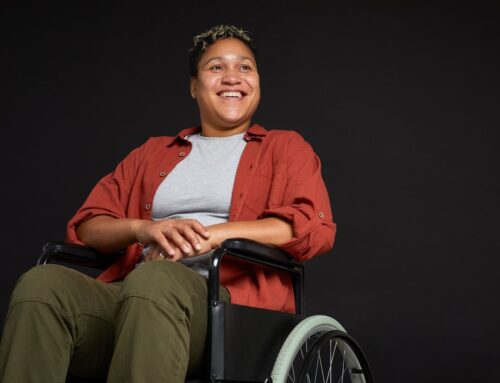
Brain Injury and Bowel Care
A brain injury can be defined as any injury to the brain that ultimately affects the functionality of the brain, such as an internal injury (stroke, neuro disease) or external trauma (fall or assault).
Bowel issues occur in 30-60% of all brain injuries, and possibly more.1 Common gastrointestinal disorders among brain-injured patients include feeding disorders, constipation, and fecal incontinence.2
Types of Brain Injuries
A brain injury can be open or closed. An open head injury occurs when something penetrates or fractures the skull, while a closed head injury describes injuries that do not penetrate the skull.3 The two main types of brain injuries are:
- Acquired – A brain injury acquired after birth (non-trauma).
- Traumatic Brain Injury – A brain injury from a trauma event. (can be moderate or severe)
Causes of Acquired Brain Injury include:
- Falls
- Assaults
- Sports injuries
- Stroke
- Near-drowning
- Aneurysm
- Tumor
- Infectious disease that affects the brain (i.e., meningitis)
- Lack of oxygen supply to the brain (i.e., heart attack)4
Causes of Traumatic Brain Injury include:
- Falls
- Motor vehicle accidents
- Sports injuries
- Gunshot/knife wound
- Workplace injury
- Blast injury
- Domestic violence
- Child abuse including shaken baby syndrome
Effects of Brain Injury and Bowel Function
After a brain injury, messages to and from the brain about bowel needs can be slowed, responses can be shortened, and the bowel may slow in functional ability. The individual may have one or more issues and may vary from one issue to another, including5:
- Constipation
- Diarrhea
- Fecal Incontinence
- Fecal Overflow
- Fecal Impaction
- Neurogenic Bowel
- Functional Coordination
- Message transmission
- Organ slow down
Common gastrointestinal disorders among brain-injured patients include feeding disorders, constipation, and fecal incontinence.
- Constipation is dry stool. It is caused by too little fluid in the stool or reduced peristalsis and can also be when it is painful/difficult to pass or an incomplete emptying of the rectum.
- Diarrhea is liquid stool. Causes include the too-swift flow of stool through the bowel without the removal of fluid.
- Neurogenic Bowel from Brain Injury occurs in 60% of individuals. Neurogenic bowel is an issue with nerve control and messaging between the brain and the bowel. It is treated with a neurogenic bowel program for individuals with too much tone or little to absent tone.4
Traumatic Brain Injury causes a delay and significant decrease in intestinal smooth-muscle contractile activity, leading to delayed transit time. A reduction in transit time can lead to clinical symptoms of constipation and dyssynergic defecation (pelvic floor muscles unable to coordinate with the surrounding muscles and nerves to produce a normal bowel movement.)
The Brain-Gut Axis
Brain injuries, particularly stroke, have been well established as a cause of GI disorders and recently vice versa.
In 2010, a neuroscientist in North Carolina discovered the Enteric Nervous System, a network of neurons that is practically a brain unto itself. The brain–gut axis or gut–brain axis is often referring to the bidirectional communications between the central nervous system (CNS) and the gastrointestinal (GI) tract (microbiota and immune system).
Cerebral injury can lead to an interruption of the axis between the central nervous and GI systems which could cause constipation. Thus, constipation can be affected by lesions of the central and peripheral nervous systems. After a stroke, lesions in the cerebral cortex, basal ganglia, brain stem, cerebellum, and lower cranial nerves may result in constipation.6
Similarly, in Traumatic Brain Injury there appears to be a disruption in communication between the brain and gastrointestinal system called the brain-gut axis. Input from areas of the brain involved in neuroendocrine and neuroimmunological integration of the viscera via the vagus complex and the nucleus tractus solitarius occur in the pons.
Projections from the vagal nuclei, which carry both afferent and efferent inputs to and from the viscera, innervate the enteric nervous system, establishing a link between the brain and gut.
Bowel Care For Those With Brain Injury
A bowel program for a patient with a brain injury should be designed to take into account attendant care, personal goals, life schedules, role obligations of the individual, and self-rated quality of life. Establishing a bowel care program includes:
- Assessment – bowel elimination pattern, oral intake, and use of laxatives, and chemical rectal stimulants
- Identifying risk for and/or existing bowel elimination problems
- Following recommended nutrition and fluid requirements
- Establishing a daily predictable bowel care time
- Adapting to Step Therapy Approach with a Bowel Care Management Program according to your facility’s patient population
- Documenting bowel movements, fluids, food intake, and medications to determine the best approaches for protocol execution
It is important to put your brain injury patients who are having bowel issues on a bowel care program. ENEMEEZ® can help.
Oral laxatives do not remove the contents of the sigmoid colon and rectum at a scheduled time, ENEMEEZ® does. ENEMEEZ® provides a reliable, safe, and predictive bowel movement within 2-15 minutes by providing a complete emptying of the sigmoid colon down to the rectum.
The very same product which relieves constipation, may help with fecal incontinence using a bowel program/training establishing a goal of consistent and acceptable continence.
ENEMEEZ® and Bowel Care
The ENEMEEZ® formulation acts as a hyperosmotic, stool-softening laxative that works by drawing water into the bowel from surrounding body tissues used to treat general constipation and incontinence. The docusate sodium in this mini enema product prepares the stool to readily mix with watery fluids. It softens and loosens stool and initiates a normal, replicated bowel movement in a timely manner.
ENEMEEZ® Plus is the same formulation as ENEMEEZ®, with the addition of 20mg of benzocaine, assisting in the anesthetization of the rectum and lower bowel. This formulation was developed for patients who experience autonomic dysreflexia, hemorrhoids, anal fissures, or painful bowel movements.
ENEMEEZ® Versus Competing Products
In a case study7 ENEMEEZ® mini-enema users had less than half of the incontinence episodes as compared to the competitor using Bisacodyl suppositories, and provided an evacuation in 35 minutes compared to 75 minutes with the competing product.
42% of Bisacodyl users experienced at least one episode of incontinence when using a suppository, whereas that number drops significantly, to only 3%, when using ENEMEEZ® mini-enemas.
Advantages of Using ENEMEEZ® in your Facility
The advantages of using ENEMEEZ® mini-enemas as bowel care for those who have a brain injury are as follows:
- May reduce nursing intervention required for in-patient bowel care, and can result in labor cost savings to the facility.
- May assist in the improvement of patient care and FIM scores associated with bowel care.
- May assist with facility savings on pads, laundry, gowns, sheets, etc. due to incontinence or fecal discharge.
- No side effects that interfere with narcotic or chemotherapy medications. Easy rectal usage for patients with pharyngeal reflex, nasogastric tube or nausea.
- May assist in reducing time missed in therapy/rehabilitation due to episodes of incontinence, prolonged bowel care, or fatigue.
- May reduce time spent with patients for dressing/redressing due to episodes of incontinence or fecal discharge.
- Fast, predictable results typically in 2-15 minutes, non-irritating formula. No afterburn.
Request ENEMEEZ® mini enema samples or an educational In-Service for your facility today.
Disclaimer: The material contained is for reference purposes only. Quest Healthcare, A Division of Quest Products, LLC, does not assume responsibility for patient care. Consult a physician prior to use. Copyright 2023 Quest Healthcare, A Division of Quest Products, LLC.
Sources:
- Foxx-Orenstein, A.; Kolakowsky-Hayner, S.; Marwitz, J. H.; Cifu, D. X.; Dunbar, A.; Englander, J.; & Francisco, G. (2003). Incidence, risk factors, and outcomes of fecal incontinence after acute brain injury: Findings from the Traumatic Brain Injury Model Systems National Database. Archives of Physical Medicine and Rehabilitation, (84), 231-237
- https://www.ncbi.nlm.nih.gov/pmc/articles/PMC3400877/
- https://www.hopkinsmedicine.org/health/conditions-and-diseases/traumatic-brain-injury
- https://www.biausa.org/brain-injury/about-brain-injury/nbiic/what-is-the-difference-between-an-acquired-brain-injury-and-a-traumatic-brain-injury
- Bowel Dysfunction and Colon Transit Time in Brain-Injured Patients Yu Hyun Lim, Dong Hyun Kim, Moon Young Lee, Min Cheol Joo Ann Rehabil Med. 2012 Jun; 36(3): 371–378. Published online 2012 Jun 30. doi: 10.5535/arm.2012.36.3.371
- Krogh K, Christensen P, Laurberg S. Colorectal symptoms in patients with neurological diseases. Acta Neurol Scand 2001;103:335–43.




![[Live Webinar] Neurogenic Bowel Dysfunction in Multiple Sclerosis](https://www.questhealthcare.net/wp-content/uploads/2025/02/325-Quest-Healthcare-Speaker-Session-1-500x383.png)


